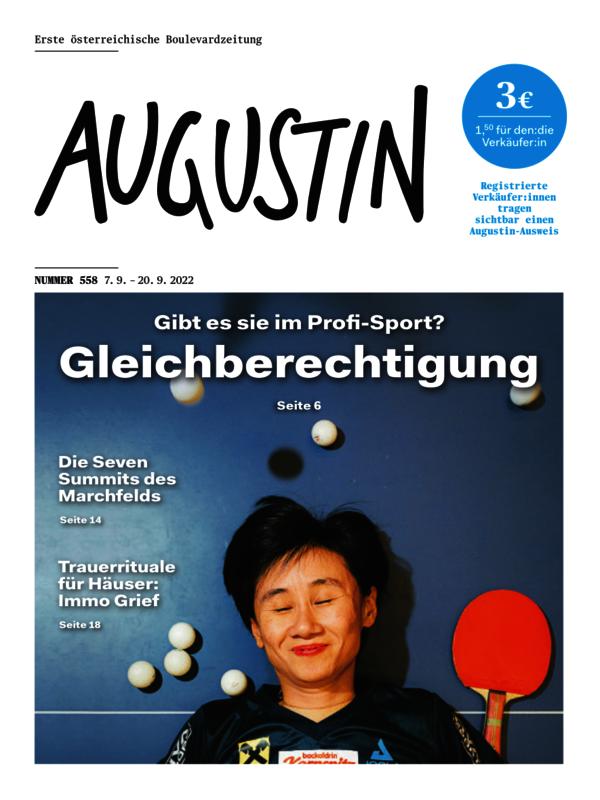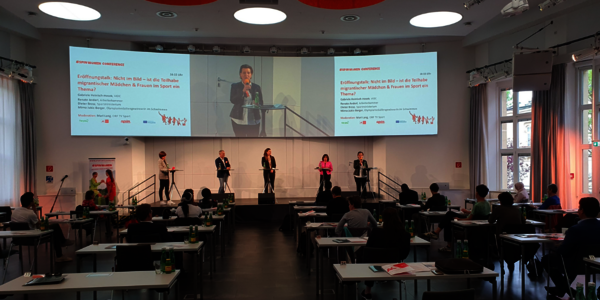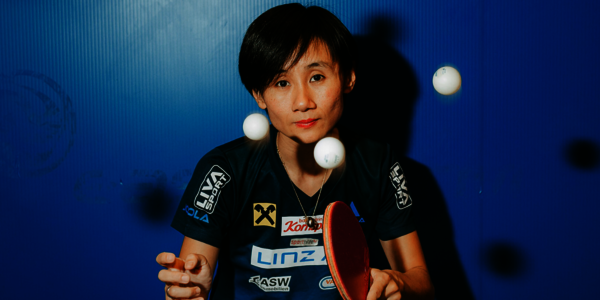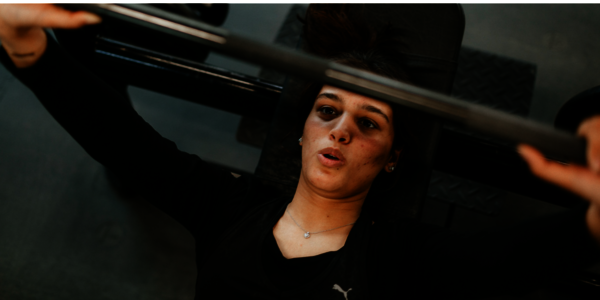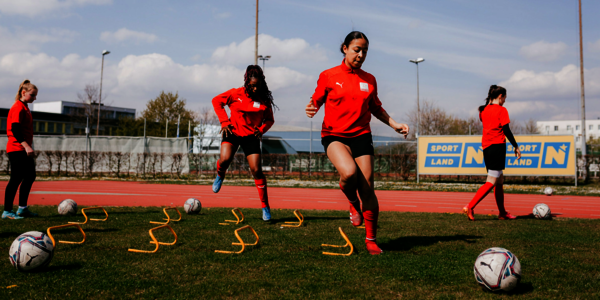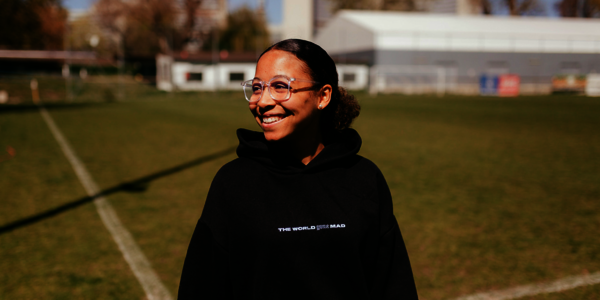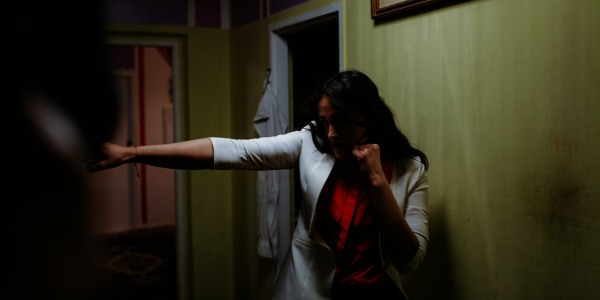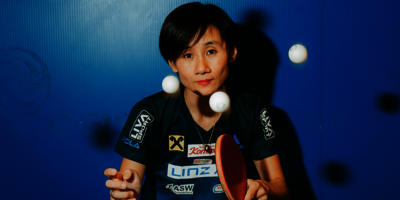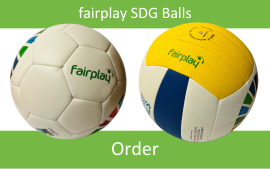"Another sports practice is possible" - report by Tania Napravnik
In this report, three structurally disadvantaged people are in the spotlight. Three female athletes from different disciplines explain how they managed to stand out in a system that works against them. Tania Napracnik also did research for this at our SPIN Women Conference, for which she also wrote a report for us. The article was published as part of an Augustin reportage grant.
Text: Tania Napravnik, Photos: Ulrich Sperl
Sport is masculine. "Historically, sport has developed as a male field since the 19th century. Since time immemorial, boys have been socialized into sports more than girls," explains sociologist Otto Penz. In other words, sport has been dominated by the male gender in its execution and organization since the beginning of its development. A look at the present illustrates this phenomenon. In 2016, the average percentage of women in the decision-making bodies of the total of 60 Austrian sports associations was 13%. This means that girls and women are severely underrepresented in decision-making and leadership positions. Furthermore, a EUROBAROMETER survey from 2017 shows that in Austria, girls aged 14 to 24 and women aged 25 to 39 are 16% less likely to participate in sports than boys or men in the same age groups. Gabriele Heinisch-Hosek, Federal Minister of Education and Women's Affairs (2014--2016), attributes the current male dominance of sports to the fact that work is still paid unequally. At a conference of the Vienna Chamber of Labor and the "Vienna Institute for International Dialogue and Cooperation" (VIDC) 2021 on the topic "An Obstacle Course - Inclusion and Participation of Migrant Women & Girls in Sport", she explained that the unpaid care work of women is visible in the field of leisure and in volunteer work in clubs and associations. This can be shown by the following questions: Who has what time for what? Who volunteers at the soccer club? Due to their domestic obligations, women have fewer time resources than men for sports or club memberships. In this respect, the traditional division of labor between the sexes is reflected in leisure time orientation and club activities. Contemporary club practices and their organizational structure are often oriented toward men's everyday lives and gender-specific attributions: Competitive training takes place in remote locations in the evening. The political scientist Georg Spitaler confirms that "the organization of care work is a central challenge in relation to sports practice in Austria. In the 'classic case,' mothers bring children to sports instead of doing sports themselves."
Brilliant female athletes. In view of these patriarchal conditions, we interviewed outstanding female athletes and experts to work out how sport can be shaped sustainably without excluding women. Penz states: "We need to think more about what kind of sports practices need to be promoted and how the male sports field can be broken up. If sport helps everyone* lead a healthy and happy life, then we can talk about sustainability." For the interviews, Nicole Ojukwu, Sahar Hashimi and Jia Liu (the latter was also part of the exhibition [un]visible - stories of migrant and non-white women in sports) chose the meeting place themselves. We accompanied them to their favorite places and talked to them about their (sports) everyday life.
Linz. We meet ex-table tennis pro Jia at her current place of work at "backaldrin", her area of responsibility is the Chinese market. "In Austria, we are not well positioned with support mechanisms for athletes so that they can make a sustainable living from sports. Women's and men's teams should also receive equal support, as is the case with soccer in the USA, for example," Spitaler emphasizes. We don't get to know any of Jia's colleagues. She likes it very much at the company, but due to Corona there is less going on at the site than before the outbreak of the pandemic. After a delicious breakfast, we move on to her home, where she lives with her husband, a cat and her daughter. It's bright, cozy and modern at her home. Quite different from our next stop at the Olympic Center in Linz, not far from her apartment. The table tennis hall looks stark and dark; there is not a single window here. The only bright spots are the successful female table tennis players, who are depicted on large posters. "In Asia, table tennis is played in a completely different way. Even in school, children train up to three times a day. Therefore, they play at a completely different level than in Europe," Jia lectures. After a short training match, we meet with former Austrian Table Tennis Association (ÖTTV) President Hans Friedinger for coffee and cake in the city center. Friedinger paternalistically reports on the successes of his "Susi," Jia's Austrian nickname. "If there is no problem awareness about the invisible exclusion mechanisms like some racism or sexism among sports officials*, then not much will change in terms of (sustainable) women's advancement," comments Spitaler. At the end of the conversation, Friedinger proudly explains the future plans for sports promotion in Upper Austria - a new table tennis hall is to be built soon. We don't find out where this is to be built or who will benefit from it.
Alterlaa. We meet kickboxer Sahar at her home in Vienna 1230. She lives with her family in a community building on the outskirts of the city. As soon as you cross the threshold of the apartment, you feel transported to another world. Bright colors cover the walls and ceilings, dog statues made of glass greet one*m, as well as numerous smiling faces in the smallest space. Sahar has six siblings, the youngest of whom was born recently. The mother takes care of the baby and finds time to serve tea and snacks. The proud father sits calmly away from the action and follows with interest. The father has always supported Sahar - without him she would probably never have started kickboxing. But it wasn't just him who was important in motivating her to take up the sport, but also her coach and family friend Majid Sobhani. "He always supported me, especially when I was at the end of my rope," Sahar describes her coach.
Kaisermühlen. We meet the talented soccer player Nicole on a beautiful spring day at the training ground of SV Donau. She comes accompanied by a new press spokeswoman, both seem not quite comfortable in their roles. Nicole grew up here in the 22nd, she lives just around the corner. However, her current center of life is in St. Pölten, she only comes home on weekends. She often has a training program from the soccer boarding school with her, which is set by the coaches and the support team. It varies in difficulty or intensity depending on the training phase. Penz elaborates: "Gender differences are always related to other social categories, such as class. Therefore, educational institutions play an important role in softening gender-specific socialization patterns -- girls go dancing, boys play soccer. In kindergartens and (preschools) or even on public sports fields, young people can get to know sports activities that don't correspond to their close family environment." If there's ever less to do, Nicole likes to play in the cage against local adults. Nicole has been training there since she was little, and the opponents* have always remained the same. "My favorite opponents, however, are the big and strong ones. I can learn the most from them," Nicole explains.
From China to Austria at the age of fifteen. Jia was discovered at a table tennis summer camp in Beijing by Yan Jun, later ÖTTV national coach. A delegation of the Austrian Table Tennis Association traveled to China frequently in the 1990s for sporting exchanges and in search of talents who seemed worthy of promotion. Jia was chosen. In China, she would have stopped doing sports, she didn't want to obey orders anymore. As a parting gift, Jia received $1,000 from her parents, who wanted a good life for their daughter. They themselves were simple workers*. "If no one comes to pick you up from the airport, just buy a return ticket to China," they advised the teenager. "In the meantime, I didn't know a bit of German or English at the time," laughs the youngster, who continues with a grin, "my parents didn't think of that at the time." Once she arrived in Austria, she was often afraid - even the streetcar seemed strange to her. Jia lived with her club boss, with whom she learned German while watching television. She explains with a grin, "I was annoying and always wanted to know what, what meant." The teenager regularly blocked her bedroom door with furnishings so that no one could enter her private space without being asked. "Simply everything was foreign and unfamiliar to me," the ex-top athlete recalls. She kept in touch with her parents via telephone booth. "You can't imagine today how it all worked back then. I was just happy to be able to escape the sports system in China. I didn't feel comfortable there at boarding school," Jia states. She received Austrian citizenship within a year of arriving in her new home country. "Naturalization gives many athletes the opportunity for a "better life" or career. This has been common practice in soccer since the 1960s," adds Spitaler, "I don't see these procedures as problematic per se. But rather that naturalization takes a very long time for other people." In international comparison, Austria has strict requirements when applying for citizenship. A lot of evidence has to be provided, including the monthly availability of just over 1,000 euros.
Fled from Afghanistan. Sahar first arrived in Greece with her family. On the advice of her father, Sahar began doing gymnastics there to distract herself from the strain of the flight. However, the family soon realized that this was not the right country for them. The Hashimis moved on to Austria, first the father, then the rest of the family. "In 2015/16, with the arrival of numerous refugees in Austria, many sports clubs opened up to "newcomers." Or rather, many clubs have been newly founded, such as "Kicken ohne Grenzen" ", explains Spitaler. Arrived in Vienna, Sahar discovered her real passion. "It all started with kickboxing. In sports, I could let out all my anger and show everyone that I've got it. In Afghanistan, women have nothing to say and are not taken seriously. They don't do sports and always listen to the men. That wasn't my vision for the future. I wanted to celebrate success as an athlete."
Born in Austria. Midfielder Nicole is seventeen years old. She got into soccer through her older brother. He often came home from training grinning, and that's when she became curious. She started at the tender age of five with SV Donau, and now goes to school at the Lower Austrian Sports Performance Center of the Austrian Football Association (ÖFB). The aim is to pave the way for talented youngsters to make a professional career. The entrance exam consists of several parts, where girls have to prove their soccer skills and psychological resilience. Only a few are accepted. For the 2022/23 school year, 27 girls beat out 53 applicants. Nicole took on these challenges -- she was motivated above all because of her mom, who is her biggest fan. She knows little about her father, only that he is currently in Nigeria. Women's soccer has been played there since 1937. At that time, the sport was still taboo for women in many places in Europe. In Germany and Austria, it was not until the 1970s that the ban on women's soccer established during the Nazi era was lifted. In 2017, the Austrian women's national team qualified for the European Championship for the first time. The Nigerian women, on the other hand, have been successful for a long time: They have already won eleven titles at the African Cup of Nations.
Greatest successes. 1:0. Nicole would like to play abroad one day and be a regular on the senior national team. "In Austria, you de facto can't survive as a professional soccer player," adds Spitaler. The teenager has numerous foreign role models, including Sakina Karchaoui, who plays for Paris Saint-Germain FC. "She's just faster than everyone else and always stands out," Nicole explains. She will start playing for First Vienna FC in the summer. She is already looking forward to that. In addition, she would like to be included in the u19 national team, for the u17 she scored the opening goal against Germany in the European Championship qualifier. However, the further course of the game was unfortunate, Austria lost the match and could not qualify for the European Championship. "We just got nervous," Nicole commented on the defeat. Nevertheless, the national team appearance was formative for her. "That was already something special. I was excited at the beginning, but as soon as I was on the field, everything was the same anyway," Nicole reminisces nostalgically.
Individual fighter. Sahar is a multiple Austrian state champion in kickboxing. Team sports were never an option for her. Sahar has changed clubs several times. She became successful at T. Fighting Gym, whose club motto is "train hard - fight fair". She took part in "fight night" competitions in the discipline of K-1. In her favorite discipline, in addition to low kicks, knee strikes to the head and body of the opponents are allowed, and the respective blows are evaluated with different points. This means that the highest number of points decides a competition or the knock out of an opponent. Apart from her own successes, it is also important for Sahar to pass on her sporting knowledge, especially to other Afghan women. She holds workshops for this target group. "Many have said to me, 'You can't do this, you're a girl.' Or, 'Stop hurting yourself.' But I never let them tell me anything and went my own way. I want to pass on this self-confidence to others," Sahar explains. At the moment, she has to concentrate on school and her job as an office worker at a driving school, so she doesn't have the time to train. In addition, her sport is expensive because the equipment, such as gumshields, shin guards and gloves, has to be purchased by herself. In martial arts, complete equipment is important, otherwise one would not be allowed to participate in competition. "Soon I would like to start training again. I don't know exactly when yet, but there are still a few medals I want to get. At the moment I'm just doing a bit of fitness. But that's okay, after all the hard training, rest does my body good. I'm also less angry now than I was during and shortly after my escape," explains Sahar.
Being there is everything. Jia has been to the Olympics a total of six times. She remembers every single time as if it were yesterday. Especially at the 2016 Olympics in Rio de Janeiro, where she carried the Austrian flag. That was a dream come true for her. "Every Olympics was a special experience," Jia explains. Unfortunately, she has an Olympic allergy - it was never enough to win a medal. At the last Olympics, she struggled with her intervertebral discs. "Winning is always easier than losing. Then you don't think about the game any further, but when I lose, the game doesn't let me go," Jia says humbly. The European Championships suit her more; she became European champion in 2005. The table tennis ace adds with a grin, "I've had many offers from abroad during my career. But I always liked it here, I never wanted to leave. I'm probably too comfortable, too Austrian - a loyal dog, so to speak. Here I have good contacts in the association and with the press. Who knows if I could have built this network somewhere else." Despite her network, spectators at competitions are lacking. "I'm not a feminist, but it's amazing that the halls are just empty at European women's table tennis competitions. At men's competitions, the audience is on the spot," Jia explains.
Equality. "Women have been excluded from sports activities for the longest time. They are just increasingly included in this male domain without questioning the basic system. Therefore, girls and women need to be given extra support," Penz says. In addition, a 2016 study by the Austrian Ministry of Sport shows that there is a demand among girls and women for forms of exercise that are hardly competitive or performance-oriented. This target group often asks for offers that are exclusively open to women. Furthermore, many mothers would like to have morning hours to practice sports while their children are elsewhere. However, many clubs currently use school sports facilities that are not made available to them during the day. Also, training facilities are generally built on the outskirts of cities because there is more space and the land is cheaper. In order to get more women into sports, gender-specific offers would have to be made. The Austrian General Sports Association (ASVÖ), which is one of the three sports umbrella organizations in Austria, also wants to significantly increase the proportion of women in national clubs in the coming years. As a sports umbrella organization, it tries above all to sensitize and support the members of its member clubs with regard to the advancement of women. It is pursuing two approaches to this end: Firstly, each national association should have a contact person (multiplier) in the area of gender equality. Manuela Fally, head of mass and health sports at ASVÖ Styria, explains: "We are trying to set an example in the association - through internal awareness-raising measures, it has already been possible to increase the proportion of women in management bodies at both federal and provincial level in recent years. For example, of 18 people on the presidium at the federal level in 2020, only one was female; now there are 4." Secondly, the new project ASVÖ - aktiv.feminin.vernetzt. was successfully launched in 2021/202. In the course of it various committee work in associations is to be made in particular women "palatable". Whether this measure will bear fruit will only become clear after a longer period of time.
Other challenges. "In kickboxing, it's important that you're not afraid of direct confrontation. I often looked terrible after a workout or competition. But it always didn't matter. I also didn't care what others thought about me," says Sahar. She usually trained with boys of the same age, even with her brother. The gender mix never bothered her, and her body was always fully covered during training - no matter what time of year it was. She has not worn the headscarf since her stay in Athens. "That was an unconscious decision. But my faith has always helped me to be successful in sports. I have always known that God is there. He gives me strength for strenuous workouts ", Sahar sums up. Nicole also used to train with boys in her early childhood. But when she was eleven, she says, training became more serious, and she began training with girls. "It was quite an adjustment. Women already tick differently than men- they stick together more," Nicole explains. In soccer, however, it is a great challenge to grow together as a team. That's why Nicole is glad that a psychologist is responsible for teambuilding and regularly conducts discussions and exercises with the group. Jia explains with a laugh: "There is only money for soccer and skiing in Austria. For table tennis, we don't even have a masseur available. We have to take care of almost everything ourselves."
Dreams. Sahar speaks four languages and wants to study marketing after graduating from high school. The kickboxer doesn't think she'll be able to make a living from sports one day. But sport will always be important to her, she says, because it has shaped her very much. For Nicole, everything revolves around soccer. She wants to make a career for herself and will do everything to achieve this goal. Jia meanwhile takes care of a lot of sports organizational matters. She secured the women's table tennis championship title for the 22nd time this year, ending her career. Ever since, Jia has been leading the new ÖTTV Girls Winning Project and made her debut as a coach, although she said it was a thankless job. "You hardly earn anything, get little recognition and are on the road all the time," the top player explains. However, "the idea of tying women to clubs by offering them jobs after their active careers end is progressive," Spitaler says.
The future of sport. Without a sports culture that is aware of social inequalities, traditional role attributions or patterns of order, such as patriarchal gender hierarchies, remain alive and well in clubs and other sports venues: "Girls in particular should learn at an early age how sports are good for the body and fun," explains Penz. Also, system-immanent distinctions are structurally decisive in who comes to which sport, and how, but dedicated coaches and support teams can counter these tendencies. In principle, caregivers are important to sustain or retain female athletes in the school system as well as in the club. "When it comes to school sports support, the only thing to watch out for is that it doesn't become a middle-class phenomenon. Care must be taken to ensure that those children are also caught who cannot be located in the educated middle class," Spitaler adds. Furthermore, role models contribute to the deconstruction of gender stereotypes in sports and help women and girls to lose their fear of certain sports. With regard to gender equality, however, Spitaler doubts the trickle-down effects of the role model effects of individual female athletes. Much more important are grassroots organizations and their inclusive approaches - such as "Kicken ohne Grenzen" (kicking without borders) - so that sports can be shaped more equally than before, the political scientist sums up. In addition, too much pressure on female athletes -- as is common in competitive and elite sports -- is not the best way to promote young talent, Jia states. "Her daughter does not have to become a top athlete. Penz, too, does not think much of competitive sports, which destroy the body and the environment: "Do we want to promote a fully capitalized "spectator sport" with all its negative manifestations - from corruption to doping to the construction of venues under conditions that violate human rights and will never be used again? That has nothing to do with sustainability." Spitaler agrees with this view: "That sport which subordinates everything to the idea of performance in a binary way, whether body or nature, is neither socially nor ecologically sustainable. The positive aspects of sport - such as empowerment through teambuilding or self-defense - are lost in the process." In short, a diverse and sustainable sport practice is an active choice that can be demanded at different levels to enable social-ecological transformations.
Many thanks to Augustin for publishing this detailed and valuable report!


